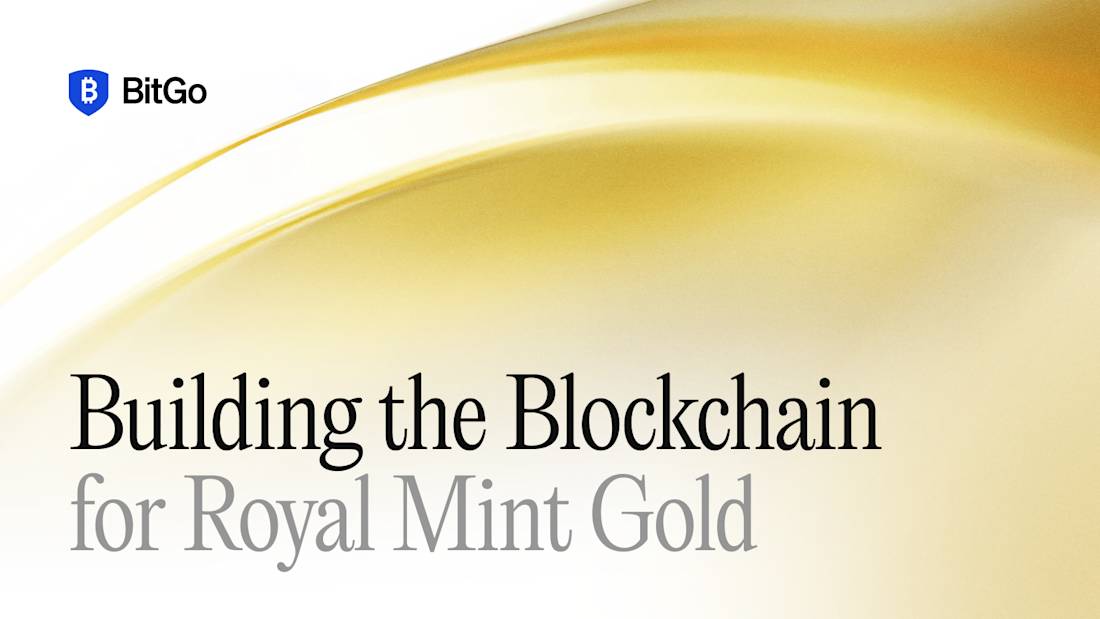Today is a big day for BitGo.
In November, 2016 The Royal Mint (Her Majesty’s Treasury) and CME Group announced Royal Mint Gold (RMG) a new digital gold spot product, offered to the market later this year, that utilizes a blockchain as its digital infrastructure. RMG will change the way gold is traded, executed and settled by making it available for trade with a transparent ledger of ownership and lower costs.
I’m excited to announce that CME and TRM have selected BitGo to help design and build the blockchain for RMG. Today we are making the code available for review here. We welcome developers, cryptographers, and security researchers to review what we’ve done and improve upon it in the future. The blockchain is now in alpha testing and transactions are being conducted end-to-end. The digital trading platform for RMG is based on technology from AlphaPoint and will be ready for use at launch.
At the technical level, this project differs from other blockchains in that it is designed for the security and digitization of a single asset. It has no asset generation through mining; rather, all assets on the blockchain represent .9999 fine gold held in 100% reserve by The Royal Mint.
The blockchain is designed for safety from the ground up:
-
All wallets are multi-signature. Security experts have long recognized the value of multi-signature wallets. Loss or compromise of a single key does not result in asset loss on the RMG blockchain.
-
No “black holes”. Due to the way the blockchain handles keys, it is impossible to send funds to an invalid address where the RMG could not be recovered.
-
All parties participating on the network are identified before being allowed to transact.
The blockchain exclusively utilizes trusted, proven technology. It does not contain experimental cryptographic functions or algorithms that have not already been heavily tested and proven in existing blockchain systems.
At the same time, the RMG system separates powers and enforces decentralization by division of roles:
-
The Asset Issuer
The Royal Mint issues RMG assets onto the chain and maintains 100% gold reserve. As the asset issuer, The Royal Mint is also responsible to authorize trusted validators on the network to verify every transaction. -
Validators
A decentralized network of validators verify and enforce blockchain transaction rules to create blocks. The community of validators initially includes academic and public institutions, corporate partners and interested customers. -
Peer-to-Peer Network Nodes
A decentralized network of nodes verify legitimate transactions to the network and verify that validators produce valid blocks, while providing full transparency into all transactions on the network. -
Account Providers
Account Providers ensure all users of the system have been identified, provide backup keys in case of loss, and provide co-signing services for additional security.
In addition to developing the blockchain code, BitGo is also developing the first wallet platform for RMG. As expected, all BitGo RMG accounts (wallets) will be multi-signature and will include all of the advanced policy management, controls and functionality BitGo customers have come to expect from an enterprise grade product.
A key value proposition for RMG is transparency: from gold price transparency, to ownership transparency, to market information availability. Increased transparency is a core value proposition for blockchains. Transparency improves trust in financial systems, reduces fraud and risk, and improves auditability.
We’ve named RMG’s open source blockchain component “Prova” which is Italian for “Proof”. More information about Prova™ can be found here.
RMG represents a major milestone for digital assets. For the first time in history, a government owned treasury, top-tier financial institutions, and technology companies have come together to innovate in a major market. Gold has never before been transparently tradable around the globe. As collaboration between blockchain solution providers and mainstream financial institutions accelerates, vast new economic opportunities will be unlocked across a range of markets.
The latest
All NewsAbout BitGo
BitGo is the leading infrastructure provider of digital asset solutions, delivering custody, wallets, staking, trading, financing, and settlement services from regulated cold storage. Since our founding in 2013, we have focused on enabling our clients to securely navigate the digital asset space. With a large global presence through multiple regulated entities, BitGo serves thousands of institutions, including many of the industry's top brands, exchanges, and platforms, as well as millions of retail investors worldwide. As the operational backbone of the digital economy, BitGo handles a significant portion of Bitcoin network transactions and is the largest independent digital asset custodian, and staking provider, in the world. For more information, visit www.bitgo.com.
©2025 BitGo Inc. (collectively with its affiliates and subsidiaries, “BitGo”). All rights reserved. BitGo Trust Company, Inc., BitGo Inc., and BitGo Prime LLC are separately operated, wholly-owned subsidiaries of BitGo Holdings, Inc., a Delaware corporation headquartered in Palo Alto, CA. No legal, tax, investment, or other advice is provided by any BitGo entity. Please consult your legal/tax/investment professional for questions about your specific circumstances. Digital asset holdings involve a high degree of risk, and can fluctuate greatly on any given day. Accordingly, your digital asset holdings may be subject to large swings in value and may even become worthless. The information provided herein is not intended for distribution to, or use by, any person or entity in any jurisdiction or country where such distribution or use would be contrary to law or regulation. BitGo is not directing this information to any person in any jurisdiction where the publication or availability of the information is prohibited, by reason of that person’s citizenship, residence or otherwise.




